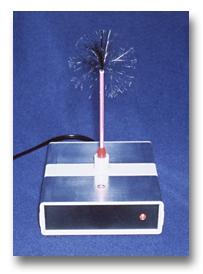Light Therapy and Negative Ionization for Seasonal Affective Disorder
Seasonal Affective Disorder (SAD) is a mood disorder in which persons experience symptoms associated with depression (sadness, low energy, weight gain, loss of interest in activities, & more) during the winter months when exposure to sunlight is diminished.
Several research studies have shown the effectiveness of full spectrum (mimics natural daylight) light therapy boxes in improving depression symptoms. Users sit beneath the lights with the lights shining into their eyes at a slight downward angle. They usually do this for about 20-30 minutes per day. Some studies have suggested that early morning is the best time for this. Research has also shown the value of negative air ionization therapy — especially at high density concentrations.  The Center for Environmental Therapeutics has information on environmental therapies for SAD and other disorders, including the use of light therapy boxes and negative ionizers. They have a useful online self-assessment instrument instrument for depression, including questions for SAD, which can be found here. The results should be discussed with a therapist or doctor. The criteria that therapists and doctors generally use when diagnosing SAD can be found here.
I have recently purchased a Day-Light(TM) light therapy box by Uplift Technologies Inc.

I have also purchased an ionization unit from Comtech Research (model IG-133DG). The various manufacturers fight back and forth as to how useful negative ions are for air purification (HEPA filter companies claim negative ions just cause dirt to cling to walls and surfaces) but that’s not the point — for help with SAD (and perhaps other forms of depression and some sleep disorders) high concentrations of negative ions are clinically indicated.
As I think I’ve said before, a high percentage of the clients who come to me seem to be adverse to taking medications. While I’m not adverse to sending someone for a psychiatric evaluation for possible medication, OF COURSE holistic drug-free alternatives should also be explored. These alternatives delight me.
They also delight the Pagan in me. Most of the light therapy options work by providing bright light at colors close to or identical to natural sunlight. Negative ions are found naturally at fairly high levels in forests and along beaches. In other words, these healing alternatives help bring us back to nature and affirm its healing value. Now, if we could all just get OUTSIDE more and go for a walk in the forest or along the beach more!!